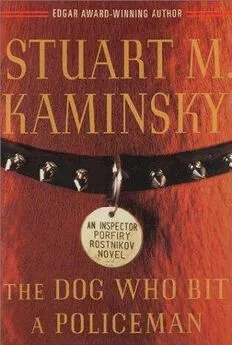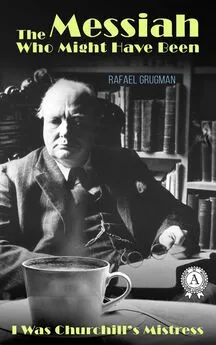Stuart Kaminsky - The Dog Who Bit a Policeman
- Название:The Dog Who Bit a Policeman
- Автор:
- Жанр:
- Издательство:неизвестно
- Год:неизвестен
- ISBN:нет данных
- Рейтинг:
- Избранное:Добавить в избранное
-
Отзывы:
-
Ваша оценка:
Stuart Kaminsky - The Dog Who Bit a Policeman краткое содержание
The Dog Who Bit a Policeman - читать онлайн бесплатно полную версию (весь текст целиком)
Интервал:
Закладка:
“May I suggest that you never tell him,” said Rostnikov. “He does not know.”
“It makes no difference now,” she said, continuing her packing.
“Maya Tkach,” Rostnikov said with a sigh. “I too am having a very bad day. Sarah may need more surgery. Elena has been mauled by a dog. I have just arrested a woman who lost her only child, and the skies refuse to rain. I think the fact that it will not rain is upsetting me more than anything else at the moment.”
“I’m sorry,” Maya said with real concern.
“Give me a bright moment,” he said. “Stay till you talk to Sasha face to face. Give him one more chance. Give yourself and the children one more chance. I am asking you shamelessly. I am laying bare my wounds.”
“I’ll think about it,” she said, sitting on the bed. “But. . will Sarah be all right?”
“There is all right and there is all right,” he said. “Think seriously about staying, at least for a while.”
Maya nodded. A lock of hair fell over her forehead. She shook it back in a gesture that surely came from Sasha Tkach.
“You don’t want to lose a good inspector,” she said.
“I don’t want to lose close friends,” he corrected. “I have lost too many of them. I must go.”
“I will consider,” she said, “but. .”
“I will accept that much for now,” he said, moving toward the bedroom door.
“I plan to finish packing,” she said.
“Yes,” he said, walking out to the other room where the baby in the crib near the door was stirring. Pulcharia’s head was buried in the book and she was frowning, trying to read. She looked up.
“Mama is crying,” she said.
“Mama is crying,” said Rostnikov.
“I want her to stop,” the child said.
“She has probably stopped,” he said.
“Did you make her cry?”
“No.”
“Did my papa?”
“I think you should ask her,” he said.
“I am very little,” she said. “I am going to be four.” Pulcharia held up four fingers.
“I know,” said Rostnikov.
“I don’t really want to go to Kiev,” she said.
“Perhaps you won’t have to.”
“Can I touch your leg?” Pulcharia asked.
“You may knock upon it if it pleases you.”
The child got off the chair, leaving her book open on the table, and hurried to the policeman. He looked down at her as she was about to rap at his leg.
“The other one,” he said.
She nodded and tapped at the leg with her tiny fist. “Is it strong?” she said.
“Very. A dog bit it yesterday. He was very disappointed.”
Pulcharia laughed.
Sasha sat in the rear of the white Lincoln Continental between Boris and Peter. Sasha had never before seen the driver, a squat young man with almost no neck. Sasha was desperate. He had to call Maya, convince her to stay, or at least wait till he could talk to her. He wasn’t sure what he would tell his wife but, at this point, he knew he was not above begging.
At the same time, Sasha had to hold himself together, not let the men on either side of him know that there was something wrong with the man they knew as Dmitri Kolk. Sasha had worn a charcoal-gray silk suit and an Italian silk tie with alternating diag-onal stripes of red, green, and blue. He attempted to maintain an air of calm and confidence. Could he look at himself through the eyes of the men who flanked him, he would know that he was doing a reasonably good job under the circumstances.
The drive was long, taking them well beyond the Outer Ring Circle to the town of Zagorsk, seventy kilometers north of Moscow just off of the Yaroslavl Highway. Sasha knew a bit about Zagorsk, but he was supposed to be a Ukrainian relatively unfamiliar with towns beyond Moscow.
“There are two places you should see here sometime,” said Nimitsov, patting Sasha’s leg. “I’ll be happy to be your guide.”
The young man smiled at Sasha, a smile so false that it chilled the policeman.
“First,” said Nimitsov, “the Museum of Art and History, magnificent relics of Russian culture from the fifteenth to the seventeenth century. Magnificent, right Boris?”
“Magnificent,” said Boris without enthusiasm as he looked out the window.
“But,” Peter Nimitsov went on, “the real treasure is the Troitsa-Sergyeva Monastery built in the 1340s and fortified in the six-teenth century with the stone wall that still exists. It became the principle protection of Russia from foreign invaders. Early in the seventeenth century three thousand Russian soldiers in the monastery held off a sixteen-month siege by a fifteen-thousand-man Polish army.”
“You know a great deal about Russian history.” Sasha said.
“I will be a part of it,” said Nimitsov. “There are a number of cathedrals in the monastery. My favorite is Uspensky Sobor, built by order of Ivan the Terrible. You must see it. There is a saying among Muscovites: ‘You must see the cathedral before you die.’ ”
Sasha knew of no such saying. There was no doubt in his mind that this was simply a game the strange young man liked to play-
and that he suspected something.
“Down there, see,” Nimitsov said, pointing down a narrow street. “You can see the wall. What I would give to be the commander of a fortress under siege. . but it is no longer so simple, is it? Armies do not attack fortresses. Heroes do not stand on para-pets. There are no more Ivan the Terribles, no Alexander the Greats.
We need a new, modern hero, one who, like them, is willing to be ruthless to. . here we are.”
They had driven beyond the town to an ancient road on which the large old stone houses were set well back from the road and hidden, for the most part, by birch trees and bushes growing close together.
Peter Nimitsov got out first, leaving the door open for Sasha to follow him, with Boris and the driver behind him. The driver and Boris stood on either side of Sasha. Peter moved ahead of them.
The door to the huge house, which was at least several hundred years old and massive, was made of a dark wood Sasha did not recognize. There was no need to knock. The door was opened by a man who looked like a larger version of the almost neckless driver.
There was something decidedly not Russian about the man who opened the door. The clothes, walk, face.
The large entry hall which stood two stories tall was sparsely furnished.
The big foreign-looking man closed the door and led them to another door across the hallway, in which their footsteps echoed as if they were in a mausoleum.
The man knocked and a voice said, “Entrez.”
Nimitsov motioned for the driver and Boris to stay behind with the guardian of the door. Peter motioned for Sasha to follow him.
The big doorman closed the door behind Sasha Tkach and Peter Nimitsov.
There were three men seated in a circle in the surprisingly small room. The five chairs were all the same, large-high backs, thick arms. A large, round, and very old table stood in the middle of the circle. The heavy table was empty. The wood of the chairs and the table was dark. Two chairs in the circle were empty. Nimitsov sat in one and Sasha in the other.
“Dmitri Kolk,” said one of the men, a rugged-looking man in his forties with an accent Sasha recognized. “There is no reason for you to know our names or anything about us. There is, however, much reason for us to know you. And we know very little about you.”
“Perhaps,” said Sasha, “you should have a discussion with the police in Kiev.”
“We have done so,” said the rugged-looking man with the accent. “Our discussions have left much to be desired.”
Sasha looked at the other two men. One was a duplicate of the rugged man, but at least twenty years older. Father, uncle, older brother? The other man was a little younger than the older man. In spite of his age and white hair, his skin was smooth and clear. One of his parents had obviously been black.
“My partners,” said the rugged man, “do not speak your language, and, as you see, I do so only haltingly.”
“Your Russian is very good,” said Sasha. “I wish that I could speak a language other than ours.”
The rugged man closed his eyes and bowed his head slightly, smiling. “You flatter me,” he said. “I will be very frank with you, Kolk.”
Sasha very much doubted the statement.
“The dogs are but a small part of our international invest-ments,” the man went on. “But we expect the dog combat to get quite large, with our enterprise moving across Europe, the former Soviet States, even Asia and the United States. We need to bring individuals like you into our business. We are very pleased that you are interested in joining us.”
“I am interested in getting rich,” said Sasha.
“If we agree to let you join us,” the man said, “you will be rich, and not in rubles. Now, if you’ll forgive me, I must translate for my partners.”
The man began a conversation in French with the two older men. He spoke very quickly and in a dialect with which Sasha was unfamiliar but which did not stop him from understanding almost all that the three men said.
Sasha looked bored, being careful not to let the three men know that he understood the essence of their conversation. Had they been English, Italian, German, or anything else, Sasha would have understood not one word.
“I told him what we agreed,” the man said in French. “What do you think?”
“I don’t trust him,” the half-black man said.
“I don’t trust him,” said the oldest man. “Young, sleek, confident. He could be the police. He could be an infiltrator from one of our competitors. He could be simply a dangerously ambitious young man like the young crazy Russian over there. I don’t trust him either. He would eliminate us and take what he could when the opportunity came. We must see that the opportunity does not come.”
“Yes,” said the rugged younger man, still in French. “Nothing new in that. We have remained cautious for a long time. We will continue to do so. What do we do now?”
“Tell him he is in,” said the half-black man. “After tonight we eliminate the young Nimitsov and replace him with this Kolk till we can select someone whose loyalty we can be sure of. Nimitsov is insane.”
Nimitsov had recognized his name being spoken and looked up cautiously, still smiling.
“I say we eliminate both of them tonight,” said the oldest man.
“We can replace them with our own people. Why let this young Kolk have the chance to grow in power?”
“All right with me,” said the half-black man.
“Et moi,” said the young, rugged-looking man. “Tonight we eliminate them both. Then we let the word out around the world. Join us and make even more money than you are making, or be eliminated. I suggest we make it particularly unpleasant deaths.”
Both older men nodded in agreement.
“Pardon my rudeness,” said the rugged man in Russian with a smile of regret. “We have decided to accept you into our enterprise. Peter, will you please ask Honore to bring in the brandy to celebrate our growth?”
The man seemed quite aware of Peter Nimitsov’s displeasure at being ordered about. Sasha was certain that the man had done this intentionally.
After drinks, with silence from the two older men and a non-stop charming discussion dominated by the rugged man, Sasha said, “I would like to stop back at the hotel to change clothes.”
“Ah, I’m afraid that will not be possible,” said the rugged man, looking at his watch. “We have already removed your dog from the car, and if you wish to spend some time here preparing him. .”
Читать дальшеИнтервал:
Закладка:










